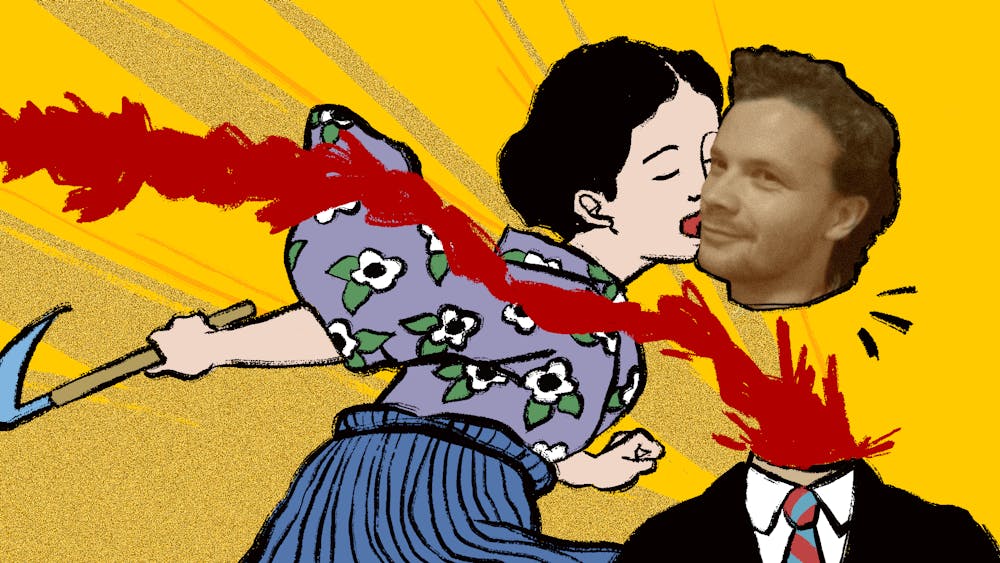In the 1976 film Taxi Driver, Travis Bickle shields his eyes watching pornography in a theater while feigning a sense of righteous power over New York City. His smallness is palpable, his horniness is devastating, and he doesn’t know what the hell to do about it. Almost fifty years later, he’s rightfully regarded as the OG film incel, embodying a charmingly pre–internet brand of male awkwardness—obviously not socialized enough to engage in romance, but without a grifter–saturated manosphere to multiply its misogyny. So what remains for the trope today, besides some awful pickup lines and prostitutes? Let’s ask the grimy, miserable, and equally theatrical protagonist of Geordie Greep’s The New Sound:
“The whirring cogs of futile despair, the anguish of answered prayers, the writhing mass of moaning torment.” Well, shit.
The prog rock outfit black midi had time and time again flaunted Greep’s wordy, esoteric yapping, sometimes hushed, often lightning–quick, and always with a storm of sweaty gusto. But as is evident now, their breakup didn’t slow him down—on The New Sound, a solo Greep is as uninhibited as ever, parading incel narratives with a strange religiosity. It’s merciless, ridiculously blunt, and absolutely gushing with discomfort.
Greep recalls satirical titans of old like Oingo Boingo, Steely Dan, and Mr. Bungle with his latest loudly objectionable character, who’s described best as someone so bloated with bluster and fantasies of courtly love that he’s driven to the point of madness. His lyrical monologues are so astronomically out–of–pocket that they’d be genuinely disturbing, if not for Greep’s over–the–top delivery and a set of dizzying jazz–rock instrumentals that just shriek theater.
Take “Holy, Holy,” which opens with Greep’s character rambling to a woman of his divine notoriety in Havana, Tokyo, and whatnot before, around the halfway mark, his insecurity spurts out: first a nasty “I'll bet your pussy is holy,” then a joyous piano break, and at last a shameless rant full of petty demands. Channeling Holden Caulfield in a breakneck crescendo, he begs to be seen entering a bathroom with her, only to sexlessly linger for a while. Dominance, it seems, is all he needs: “I want you to look at me as if you're lost / How much will that cost?”
The charade lasts for the album’s full 62 minutes. On the opener “Blues,” it’s all about bigness—blistering repetitions of “Do you know what I mean?” swear control in conversation, alongside such standard affirmations as “you can cum more than a hundred stallions!” “Walk Up” is a winding snapshot of the protagonist’s thoughts after visiting a prostitute (“You still smell her snatch / As you trawl the accounts”), and the following “Through a War” sees him fall in love, his fragility fully exposed with the most Roman–Empire–coded admittance possible: “For your touch, I'd have conquered every village in the land.” It’s an extravagant and hilarious outing, evocative of Sun Tzu–spouting self–help men, unable to see love as anything but conquest.
Sonically, The New Sound is phenomenally constructed, its genres dancing as manically as its temper. Beyond the expected UK prog influence on tracks like “Blues,” there’s a strong Latin flair as well, with sultry Tropicália, vigorous samba, and wildly unserious salsa, and it comes as no surprise that a portion of this record was produced in São Paulo. “Terra,” for instance, pairs crooning about human suffering with a delightfully engineered arrangement of horns and whimsy hauled straight from Brazil.
Of course, slivers of jazz abound too, with the title track exercising masterful third stream freneticism that signifies a narrative turning point. “Bongo Season's” self–described “passing traffic” shuffles around instruments with minds of their own, to all be hypnotically stretched and compressed and melted. These excursions are particularly transportive, tailored for jazz clubs and smoky bars, as if the titular “new sound” is really in reference to the impact of live performance.
But the theater isn’t always so engaging. “Motorbike” is a detour that feels divorced from the rest of the album, following a husband dropping his life for a bike—it’s executed with unwavering intensity but treads themes better conveyed on other tracks. The final songs, however, take it all the way home, as more layers peel back to reveal a sad sincerity.
“As If Waltz” is notably not a waltz, but almost eight minutes of the protagonist indulgently simping for a sex worker, dreaming up such delights as hearing her thoughts on Proust, living out a cuck fantasy, and, very importantly, kissing “while fully clothed.” From the relatable urge to impress to the sad eroticization of shame, you can weirdly sympathize with the guy. The band backs this sentiment, cascading into a beautiful storybook orchestral arrangement, as if Snow White’s friends had pranced into the scene.
The album climaxes at “The Magician,” a soft–spoken twelve–minute monster where the real and the imagined blur together and the protagonist succumbs to a great unfulfillment. “What’s left of the lover / Who doesn’t exist?” he asks, over sobbing strings that expand into a writhing cacophony fit for any Broadway stage—ironically, it’s a fantastically fulfilling centerpiece. The closer, “If You Are But a Dream,” is a jazz standard cover that’s lightyears away from the black midi sound, but feels chillingly at home here. Echoing a famously womanizing Sinatra, the wannabe–womanizer protagonist accepts his illusions with a full and open heart: “If you're a fantasy / Then I'm content to be / In love with lovely you / And pray my dream comes true.”
It’s a vile, unrelenting journey, but Geordie Greep’s tales echo harshly as a reflection of the very real failed socialization of those struggling with masculinity. At the same time, they go down like honey, thanks to an ingeniously orchestrated group of instrumentalists and a gladly delusional finale. As the curtains finally close on The New Sound, our pitiful hero’s smile grows wide, while, crucially, his eyes remain shielded.

